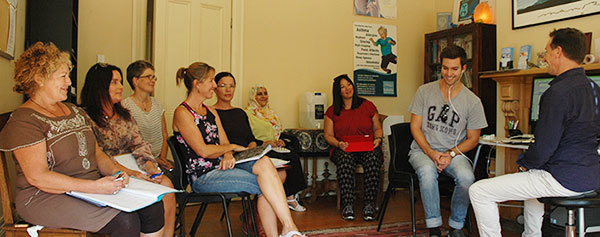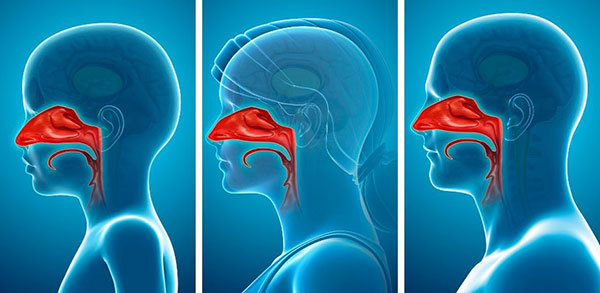|
Autumn News 2021
Upcoming Buteyko Breathing CoursesBreathing Course for Health Professionals
At time of writing, we have four places remaining on the upcoming breathing course for health practitioners: Monday 12th – Thursday 15th April, 11:00am – 12:30pm This course run by Glenn White is for health practitioners and students seeking more in-depth learning and technical discussion than possible on our regular courses. The course includes six sessions in total: five 90-minute group sessions and one 60-minute individual session at approximately 6 weeks. The course also serves as a prerequisite for those interested in practitioner training. Please contact for details.
A special programme for children and teens will run in the first week of the school holidays. Monday 19th – Thursday 22nd April, 11:00am – 12:00pm Learning should be fun and the programme is tailored to keep children and teens engaged for quick results. “I have seen children with asthma improve drastically and quickly with the Buteyko breathing exercises, as taught by Glenn White. The children were able to significantly reduce or even stop their asthma medications within weeks to months. I have also seen children with ADHD calm down and able to focus better on their learning. I have witnessed children with sleep problems starting to sleep well and children with anxiety become calm and relaxed.” Leila Masson, M.D., MPH, FRACP, DTMH, IBCLC
Paediatrician, Lactation Consultant and author of Children's Health A-Z Please contact us for details. A full course schedule is available on our website.
Bookings can be made online or by contacting the clinic.
Breathing to Boost Natural Immunity
The New Zealand Government, our Ministry of Health and frontline workers
have done an exemplary job in securing our borders and keeping New Zealand Covid
free. However, as mentioned in our Spring 2020 news, missing from official
guidelines is advice on how you can boost your natural immunity.
When ENT specialist Dr Maurice Cottle (founder of the American Rhinologic Society, 1954) identified 30 reasons to nose breathe he did not mention nitric oxide (NO).[1] That’s because the role of NO in regulating biological functions in humans was yet to be discovered. In 1998, researchers on the complex roles of NO within the body were awarded a Nobel Prize for their work.[2] It has since been referred to as the third respiratory gas along with oxygen and carbon dioxide. Scientists have previously highlighted the importance of nasal breathing in preventing the spread of infections, indicating that where facemasks fail, the nose may provide a natural filter for dangerous pathogens. It is relatively obvious that the nose filters, warms and humidifies air on its way into the body, whereas mouth breathing does not, but there is more to the nose than you might realise.
Functional Breathing to Boost Immunity An ideal breathing pattern: - Nasal breathing at rest, when sleeping and up to moderate levels of physical exertion.
- Minute volume of 4-5 litres of air at rest (about 8-12 breaths/minute).
- Regular rhythmic breathing (very few sighs, yawns, coughs, catch-up breaths).
- Diaphragm breathing (80% at rest).
The above parameters help boost immunity and fight infection in the following ways: - Nasal breathing warms, filters and humidifies inhaled air before it reaches the lower respiratory tract.
- An optimal minute volume (MV) combined with nasal breathing helps reduce the load of inhaled pathogens.
- Lower MV and nasal breathing help maintain the delicate balance of gases, O2, CO2 and NO, in airways and blood.
- Lower MV means increased levels of both NO and CO2 which help soothe the nasal and lung mucosa and mediate cellular defence.
- Both NO and CO2 are vasodilators and bronchodilators helping maintain airway and vascular tone and ensuring oxygenated blood is delivered throughout the body.
- An optimal level of CO2 in arterial blood is essential for the delivery of oxygen from haemoglobin to cells in the body. This is known as the Bohr Effect, first described by Christian Bohr in 1904.
By contrast, breathing through the mouth upsets the delicate balance of gases in airways and blood, lowering NO, CO2 and O2. Mouth breathing also engages the secondary respiratory muscles and the sympathetic nervous system (fight or flight mode). When the SNS is dominant, the immune system is down-regulated.
Below are two breathing exercises to help clear nasal passages and boost your natural immunity.
Humming Exercise Here is a simple humming exercise you can do if you feel you are coming down with a respiratory infection, sinusitis, or are unwell. You can do it any time as a preventative measure to help boost immunity. We associate humming with cheerfulness and you’ll notice that it’s difficult to hum and feel down at the same time. Immune protective effects of nitric oxide and humming »
Nose-Clearing Exercise Some people breathe through the mouth simply through lack of awareness. For others there could be a physical impediment such as nasal congestion. Many habitual mouth breathers do so simply because they get an unpleasant sensation that they just can’t get enough air through the nose. This is particularly true in children who habitually mouth breathe. Mouth breathing and over-breathing are characteristic responses in times of stress. As breathing educators we work with people to help them pull out of this cycle and establish a more functional breathing pattern. Often the first step in this process is to relieve nasal congestion. There are many interventions that can improve nasal breathing including reducing dairy and consumption of refined carbohydrates. For quick relief we suggest you try this nose unblocking exercise: Clear a blocked nose »
Breathing for Everyday Activities As mentioned earlier in this article, less is more when it comes to breathing – in the same way that good nutrition is not about eating more. A good start is the ability to breathe through your nose at rest and up to moderate levels of physical exertion, like climbing stairs, or if you are fit, jogging. You should also breathe through your nose when sleeping and symptoms like bad breath, strong thirst, or dry mouth on waking are indications that you are probably breathing through your mouth when sleeping. Snoring, sleep apnoea, insomnia, restless sleep or blocked nose on waking are also signs that you are likely to be over-breathing through your mouth in your sleep. The breathing pattern in your sleep is a mirror of your daytime breathing. The implications of this are that you probably have a dysfunctional breathing pattern which is not only impacting on your sleep quality, but potentially impairing your health and immunity.
What You Can Do At the time of writing, new findings are suggesting that the COVID-19 virus may spread as an airborne aerosol, like SARS.[3,4] It is therefore imperative to breathe in and out through your nose as gently as possible, not only for your protection, but also for those in your vicinity. If you are exercising, reduce the pace and intensity as necessary, to enable you to maintain comfortable nasal breathing. This will minimise the chance of inhaling and spreading germs and has the added benefit of generating the germicidal power of nitric oxide for your own protection. Masks are effective in helping to reduce hand-to-face contamination, but may also help in reducing exposure to airborne particles. The widespread use of masks in China and Japan is implicated in helping slow the spread of the virus. Keeping to your isolation bubble and maintaining a respectful minimum 2-metre distance from others are essential measures, as is advice to wash your hands regularly using soap and water.
Boosting Immunity – The Bigger Picture The focus of this article is breathing and for optimal results should be accompanied by other immune-boosting measures, including productive sleep, good nutrition, adequate hydration, physical exercise, reducing stress and maintaining social contacts (virtually, if lockdown is in place). In addition to these, studies have shown that supplementation with therapeutic levels of vitamin C, vitamin D and zinc may assist in the prevention and treatment of respiratory infections. Vitamin D, the sunshine vitamin, may confer protection against respiratory infections and COVID-19 infection rates might be expected to be higher in northern countries emerging from winter.[5] A randomized, double-blind, placebo-controlled trial compared vitamin D3 supplements (1200 IU/d) with a placebo in school children. The study concluded that vitamin D3 supplementation during the winter may reduce the incidence of influenza A.[6] A 2016 meta-analysis to assess the overall effect of vitamin D supplementation on the risk of acute respiratory tract infection reviewed results from 25 randomised controlled trials (total 1,321 participants, aged 0 to 95 years). It showed that vitamin D may help prevent and treat respiratory infections.[7] A case study published in Canadian Family Physician reported reductions in flu or influenza-like illness in a rest home population given supplemental vitamin D. Patients who did have influenza were treated with a one-time 50,000 IU dose of vitamin D3 or 10,000 IU three times daily for two to three days.[8] There are a number of studies reporting success using high-dose vitamin C in combination with other treatments for sepsis.[9,10] Research is being undertaken in the use of high-dose vitamin C to treat COVID-ARDS in hospitals in China, Italy and New York.[11] If successful, this potentially offers a relatively inexpensive and readily available treatment to help reduce the morbidity and mortality rates from acute respiratory illnesses. Studies have demonstrated preventative zinc supplementation may assist in reducing mortality from respiratory infections, especially in cases of zinc deficiency.[11,12,13,14,15]
Note:
Please note, neither this post/blog nor any linked articles claim that nasal breathing or humming prevent or cure COVID-19. However, now more than ever, it makes sense both for physical and psychological reasons to take any steps that may improve our health. Like the advice to wash our hands frequently, the advice to nasal breathe also gives us a sense that there is something we can do, a sense of control and anything that makes us feel less stressed is also good for our immune system.
Booking a consultation or course You can book a consultation or course online. For more information on ways to boost your natural immunity, you can contact our clinic and speak with a practitioner. Tel: 09-360 6291
Written by Glenn White, BSC, MBIBH, BBEA, Breathing Educator and Nicky McLeod, BA, MBIBH, Breathing Educator, March 2020 We acknowledge and thank our colleagues including Rosalba Courtenay, Patrick McKeown, Jill McGowan, Tess Graham for their invaluable and ongoing contributions about the importance in boosting natural immunity to prevent and overcome respiratory infections, including COVID-19.
References
- Cottle MH American Rhinologic Society seminar Respiratory Physiology and Rhinomanometry, New Orleans, Louisiana 1972 https://www.aipro.info/wp/wp-content/uploads/2017/08/work_ways_patterns.pdf
- Nobel Prize in Physiology or Medicine for 1998 awarded to Robert F Furchgott, Louis J Ignarro and Ferid Murad for their discoveries concerning “the nitric oxide as a signalling molecule in the cardiovascular system”. https://www.nobelprize.org/prizes/medicine/1998/7543-the-nobel-prize-in-physiology-or-medicine-1998/
- WHO update 29 March, 2020: Modes of transmission of virus causing COVID-19 https://www.who.int/news-room/commentaries/detail/modes-of-transmission-of-virus-causing-covid-19-implications-for-ipc-precaution-recommendations
- The Scientist 3rd April 2020 The COVID-19 Coronavirus May Travel in Aerosols https://www.the-scientist.com/news-opinion/the-covid-19-coronavirus-may-travel-in-aerosols-67380
- Umhau JC. Casting Sunlight on an Epidemic - Is vitamin D a critical host factor to prevent COVID-19? MedPage Today25th March 2020 https://www.medpagetoday.com/infectiousdisease/covid19/85596
- Urashima, M Am J Clin Nutr 2010;91:1255–60. https://pubmed.ncbi.nlm.nih.gov/20219962/
- Martineau AR et al BMJ 2017;356:i6583 https://www.bmj.com/content/356/bmj.i6583
- Schwalfenberg G Can Fam Physician. 2015 Jun; 61(6): 507. https://www.ncbi.nlm.nih.gov/pmc/articles/PMC4463890/
- Kashiouris, M.G. et al Nutrients, Jan 22 (2020). https://www.ncbi.nlm.nih.gov/pmc/articles/PMC7070236/
- Ruben ML et al Expert review of anti-infective therapy 2020, VOL. 18, NO. 2, 99–101 https://www.tandfonline.com/doi/full/10.1080/14787210.2020.1706483
- Newsweek New York hospitals are using vitamin c to treat some coronavirus patients 26-03-2020 https://www.newsweek.com/new-york-hospitals-vitamin-c-coronavirus-patients-1494407
- Yakoob MY et al. BMC Public Health 2011, 11(Suppl 3): S23 https://www.ncbi.nlm.nih.gov/pubmed/21501441
- Malik, A et al Indian Pediatrics Vol 51 October 15 2014 https://www.ncbi.nlm.nih.gov/pubmed/25362008
- Roth DE International Journal of Epidemiology 2010;39:795–808 https://www.ncbi.nlm.nih.gov/pubmed/20156999
- Lassi ZS Moin A, Bhutta ZA Cochrane Database of Systematic Reviews 2016, Issue 12. https://www.cochranelibrary.com/cdsr/doi/10.1002/14651858.CD005978.pub3/full
|
|






